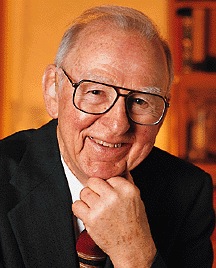Edwin G. Krebs
Edwin Gerhard Krebs was an American biochemist. He received the Albert Lasker Award for Basic Medical Research and the Louisa Gross Horwitz Prize of Columbia University in 1989 together with Alfred Gilman and, together with his collaborator Edmond H. Fischer, was awarded the Nobel Prize in Physiology or Medicine in 1992 for describing how reversible phosphorylation works as a switch to activate proteins and regulate various cellular processes.
Krebs was born in Lansing, Iowa, the third child of William Carl Krebs, a Presbyterian minister and Louise Helen Krebs. The family moved frequently due to the nature of his fathers work, though they settled in Greenville, Illinois when Krebs was six and remained there until his fathers unexpected death in 1933. Louise Krebs decided to move her family to Urbana, Illinois, where Krebss elder brothers were attending the University of Illinois at UrbanaChampaign. Krebs attended Urbana High School, and enrolled at the University of Illinois at UrbanaChampaign in 1936. In his fourth year of study Krebs had decided to either pursue a higher degree in organic chemistry or study medicine. Receiving a scholarship to attend Washington University School of Medicine in St. Louis, he chose the latter.
Source: Wikipedia

